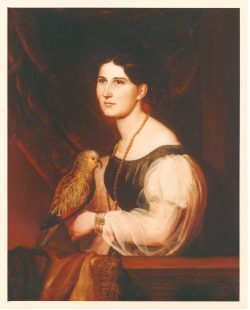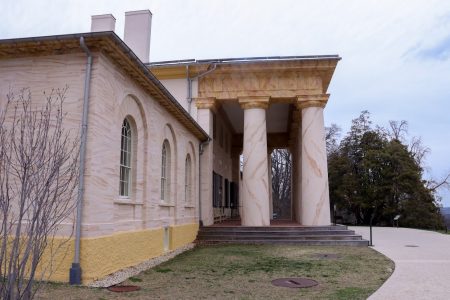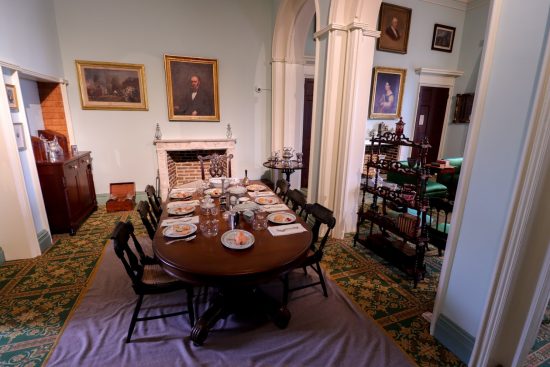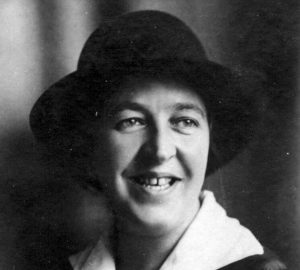
It was a pleasant day in Lexington, Virginia. All was going on as usual on the grounds of Washington College. A passerby on the street may have noticed a sixty-year-old woman on the front porch of the president’s house. Her seat was a wheelchair. Her crippled hands were mending her family’s clothes. She was an intelligent woman. She was well beloved by her friends and family. Yet, her firm expression, not to mention her infirmities, told the story of suffering.
Never far from her mind were the memories of her former life. She had a happy life years before this. She once lived in a beautiful mansion called Arlington, overlooking the Potomac River. She was an only child doted on by an indulgent father and a godly mother. She grew up revering the memory of George Washington, her great-grandfather, and hearing story after story while touching with her hands the many mementos from his life. Being an intelligent and attractive young lady, she enjoyed society and was the at the center of every event her father hosted.
It was at one of these events that she first experienced the work of the Holy Spirit in her life. Rejoicing in the Lord’s mercy, and weeping over the sinfulness of her own heart, she placed her full trust in the Lord Jesus with a faith that never wavered her whole life. The desire of her heart was to be close to her Savior and to be made more like Him – her own sins purged away – no matter the cost.
She also remembered with joy the day she gave her hand in marriage to a handsome young officer, a graduate of West Point. Her home had been decked with garlands, lights, and all the guests were shown warm hospitality. Little did she know how famous the name of Robert E. Lee would become or how much sacrifice the two of them would be called upon to give in the years ahead.
Robert E. Lee and Mary Custis had grown up together and their deep love for each other would remain true and faithful till the end. Mary did not find it easy to transition from being the only child of Arlington to being the sole housekeeper of a little house with two rooms and a dirt floor. She was honest about herself and by her own admission, she often failed to keep things in proper order. She much preferred visiting with friends, reading, and painting. When their children were born, she knew she was slack in discipline. As Robert was often away on military assignments, he wrote to her, gently chiding her for her laziness and asking her to be more strict with the children.
Hard as it was, Mary’s desire was to be all that God wanted her to be, and she did not despise the letters her husband wrote to her about her household management. While Mary may not have started out as an ideal housewife and mother, she grew in grace over the difficult years of caring for her seven children – mostly by herself. Mary spent much time in prayer for her husband and children, and for her own sanctification – she prayed often for the Lord’s help in preforming the duties required of her.

Much of her days were spent bringing her children to Arlington for long visits with Mary’s parents, Mr. and Mrs. Custis. Mary and her children helped tend to the fragrant gardens, played on the lush green lawn, and admired the many Washington artifacts and paintings that Mr. Custis collected. One day, all of Arlington would belong to Mary. But she was in no hurry for that day. She relished the time with her parents. This was home to her and always would be. When Robert was home, he also enjoyed time at Arlington and he relished spending time with his family.
Mary had matured much by the time Robert, now Colonel Lee, received an appointment to become the superintendent at the United States Military Academy at West Point. As the superintendent’s wife, she was a gracious hostess and fulfilled her duties well. She was pleased also to see that her children were growing up with a sense of purpose and a desire to follow Christ.
It was during this time, however, that her mother died suddenly. Her father did not live long after the shock of his wife’s death. Colonel Lee obtained leave from military duty for a time, and the Lee family moved to Arlington to settle the matters of Mr. Custis’ will. As far as he and Mary knew, this would be their home for the rest of their lives.
However, the turmoil brewing in Washington – just across the Potomac – brought an end to their home life at Arlington. When Virginia seceded, Colonel Lee resigned from the United States Army. When it became clear that the Union soldiers were planning to seize her beloved Arlington, Mary reluctantly packed up what precious relics she could and drove away, thinking she would be back in a few weeks.
However, Mary and her children lived as fugitives during the War Between the States. Her husband and three sons, Custis, Rooney, and Rob, all served in the Confederate Army. Her prayers for their safety ascended daily. Mary’s four daughters, Mary, Agnes, Annie, and Mildred sometimes lived with her and sometimes stayed with friends throughout the war. Mary was incensed at the treatment of the Yankees to Arlington – it was being ruined and used as a graveyard. She clung to the hope that Arlington would be restored, though her husband tried to help her accept her loss.

A major trial in Mary’s life was the breaking down of her physical health. What started as stiffness in her knees became rheumatism which took over her body and left her nearly crippled, hardly able to walk even with crutches. Though her hands were gnarled, she often gave thanks that God had “spared her eyes and her hands.” She put them to use. She knitted socks and sent them to General Lee. As he gave them away to other soldiers, Mary knitted more, making her habit to knit every morning with whoever would join her. One winter and spring she and her daughters knitted 859 pairs of socks and 190 pairs of mittens! Once a spoiled daughter inclined to laziness, Mary was now a humble wife and a praying mother whose industry rebuked the Southern women who were trying to forget the war by playing cards and hosting taffy parties.
After the War, General Lee became president of Washington College, and secured a home for Mrs. Lee for her final years. Though her sorrow over the loss of Arlington never left her heart, she learned, eventually, to let go of her bitterness. She interested herself in the V.M.I. students and made it a point to personally meet every new student. She continued to sew and knit and make items to sell, raising funds for her church.
She endured the sorrow of seeing two daughters, three grandchildren, and then finally her husband laid to rest – all of whom she had hoped would survive her. But in these she clung to the hope of Heaven. She had written to her son years earlier, “It seems a pity that in this short life we should be so much separated from those we love; yet all is meant to teach us that earth is not our home, that only in heaven are we to look for perfect bliss. There parting and sorrow alike are unknown.”
A young wife of one of the faculty at Washington College saw in Mrs. Lee “one in whose footsteps the women of the South should follow,” displaying “the true heroism of life; for Mrs. Lee had accepted her fate and met it bravely, had cherished her affections, had performed her duties, and had shown that duties faithfully discharged bring a dearer recompense than any circumstance of ease and luxury can supply.”
When Mary Custis Lee died in 1873, she was materially poor, though she had started out rich. However, the Lord had given her spiritual riches that were far beyond comparison. Let us too pray with Mrs. Lee that our faith would not waver, but that we would be faithful in our duties, come what may upon this earth.
Drawn from Mrs. Robert E. Lee – The Lady of Arlington by John Perry




